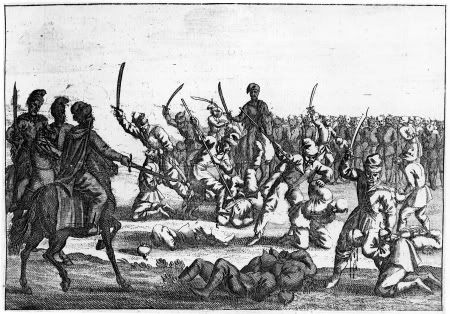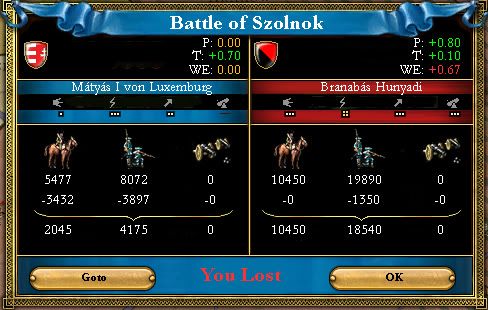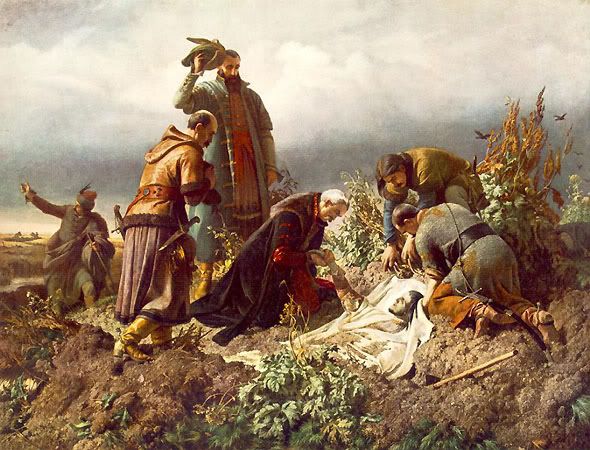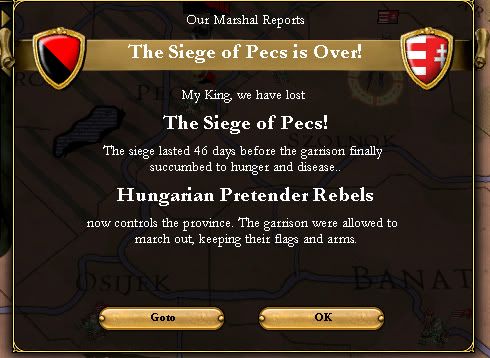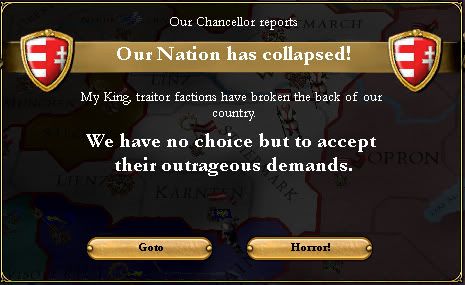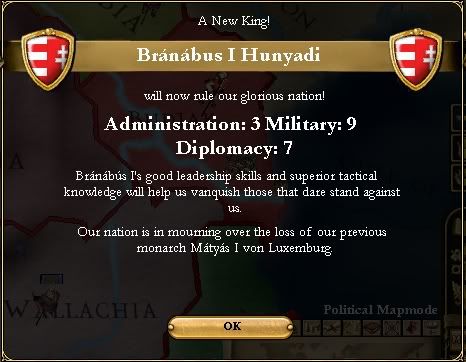Chapter IX – The End of the Magyar Rebellion
The defeat at the Battle of Transylvania was a staggering achievement for Branabus Hunyadi and the Magyar rebels. It not only gave hope that the rebellion could be successful, but it reassured many wavering Hungarians, under the brutality of Matyas, that Hunyadi could overcome the young king. With the defeat, Matyas’s army withdrew to Ersekujvar to lick its wounds. Instead of chasing after Matyas for a final confrontation, Hunyadi was content in seizing towns from royal forces in Carpathia, Ruthenia, and Lublin to bolster his own army and show the Hungarian people that the rebel army was there to help—not to destroy their lands or kill innocent people.
(1)
By 1430, Hunyadi’s army had retaken many of its lost provinces during the whirlwind campaign of Matyas in the past few years. Most of the provinces would be retaken rather easily, due to many of the royal garrisons withdrawing when defeat of its main army in Transylvania was heard. The victory not only gave Hunyadi the rebels' previously controlled territory, but it also spurred new recruits. Many of these men were not soldiers but had heard tales of Branabus Hunyadi, the
Victor of the Magyars. Their interest on seeing the man who had never seen defeat drove many to join the army and march, hopefully victoriously, to Buda.
Some of these men were led by local leaders, who hearing of the rebels’ success, believed that they could successfully lead an attack on royal forces—one such man was Emo Andrassy. A local lord in Ersekujvar, Andrassy was able to muster 4,000 men to fight for the rebel cause. These men, drawn from towns around Ersekujvar were not professional soldiers but merely farmers. Seeing the chance for adventure and glory, Andrassy boldly but foolishly decided to surprise Matyas’s battered remnants of an army on June 11, 1430.
(2) The Battle of Nitra River as it would later be called was one of the shortest battles in Hungarian history—eight minutes long. King Matyas, though still recovering from his devastating defeat in Transylvania still had a formidable army, numbering around 15,000 men—though only about 11,000 were probably fit for battle. Hoping to take Matyas by surprise, Emo Andrassy ordered his army to attack the rearguard of the royal army. By sweeping in from the right and escape from behind blocked by the Nitra River, Andrassy expected the rearguard to fold without many casualties. However, the rearguard was Matyas’s battle-hardened soldiers, men who had served under his father, Sigismund I. As Andrassy’s men attacked, it soon became clear that the guard would not surrender. Soon realizing that his rearguard was under attack, Matyas and his cavalry charged into Andrassy’s men. The poorly armed and unfortunately led rebels were completely crushed. Many of the Hungarian farmers would be struck down, even when trying to surrender. Yet again, Matyas did not stop his soldiers from massacring its enemy—at least not at first. Though the battle lasted nearly eight minutes and very few casualties were inflicted in combat, over 1,500 Hungarian rebels were slain, including its unwise leader, Emo Andrassy. The aftermath was unmistakable, King Matyas allowed his army to quench its blood-thirst at the expense of the rebels.
As one Hungarian noble—who fought with King Matyas—would later write years later on the Battle of Nitra River:
The battle ended before most of the cavalry could reach the enemy. I saw the enemy throwing down their weapons, some lowering to their knees to show their surrender. The rebels did not run which I remember surprised me to see, everyone tries to run, but not them. They submitted without much of a fight, hoping their Magyar brothers would show mercy. This did not happen as I soon saw one, two, and more royal soldiers slashing, cutting and piercing human flesh. Before I could even gather words to speak, numerous rebels were already dead, killed by their own brethren. I ordered the common soldiers to stop, but they defiantly massacred the poor souls. I looked around for King Matyas, hoping that his arrival would cease this madness, but my deepest horror soon appeared. King Matyas was not far from me, watching the slaughter. He did not have much of an expression, his eyes glaring at the cruel display. Finally, after what seemed to be an eternity of a deplorable scene, his eyes turned away from the killing. The swords soon stopped, but I—haunted by the memory—remember the blood of the fallen victims continued to flow, deep red on a once vibrant green plain.(3)
The Battle of Nitra River would become a rallying cry for the Magyar rebels.
News of the battle would erupt a terrible gale of outrage and turmoil throughout Hungary, especially in the ranks of Hunyadi’s army. Though Emo Andrassy and his men were incredibly arrogant and foolishly spent their lives on a hopeless attack, it was still an atrocity that Hungarians as well as other Europeans would condemn. King Matyas would defend his actions based on the fact that the rebels were traitors to the country—they deserved a traitor’s death. Yet, the brutality was getting out-of-hand. Branabus Hunyadi, with his strengthened army of 30,000 Magyars marched toward Buda, anticipating a final battle with King Matyas. This time, King Matyas knew retreat was not an option and he needed to score a victory of the rebels, before more joined its ranks.
In March 1431, the Magyar rebels entered the region of Szolnok and laid siege to Eger. The fortress of Eger capitulated on April 2. King Matyas leading an army of 14,000 men were too late to try and lift the siege on the beleaguered city before it surrendered. Even with Eger taken, Matyas chose to fight near Eger instead of withdrawing.
(4)
The Battle of Szolnok would be more of a contest than many would have believed. Though Matyas was facing a force doubled his size, his army fought competently and proudly. The Royal Army under Matyas was a contingent of loyal soldiers of Sigismund I and had seen many campaigns, including Poland as well as the Crusades against the Turk. These tested soldiers fought bravely against Hunyadi’s army. At first, the battle lines were fighting to a standstill; King Matyas was personally holding the right flank, in case Hunyadi tried to turn it. The sheer numbers of Hunyadi’s army were not able to fully deploy against the Royal Army due to the heavy forests around Eger. This allowed Matyas to fight the rebels on more of an equal footing. The morning had passed, with the odds slightly turning in favor of King Matyas by noon break. His center had repulsed the rebels twice and was beginning to push them back, while his flanks continued to hold. Branabus Hunyadi, sensing the tide was turning against him, decided on a bold maneuver. His reinforcements that were heading toward the center to fight against Matyas’s counter-attack, were ordered to the right flank, where Matyas was stationed. This was a grave gamble on Hunyadi’s part, for without reinforcements, his center would eventually crumble. Hunyadi, believing his center could hold, concentrated on the right flank. King Matyas, seeing that Hunyadi’s center was weakening, ordered more men to the center to break the rebels. Hunyadi, knowing he had only a small amount of time, charged the right flank with his cavalry as his infantry supplemented the attack. The right flank, along with King Matyas was soon in disarray. The right flank was hard-pressed and eventually broke when their reinforcements did not appear—the same reinforcements that were ordered to the center earlier by Matyas. In the chaos, Magyar cavalrymen would charge deep into the right flank’s formations. In this charge, King Matyas would be unhorsed and killed.
(5) With the king fallen, a rout began.
The Battle of Szolnok was the decisive battle of the Magyar Rebellion.
Matyas’s body would be gathered by some of his loyal soldiers during the rout and carried off away from the battlefield. Outside of Eger, in an unknown location, King Matyas of Luxembourg, the son of Sigismund I of Luxembourg would be hurriedly buried. His subjects did not want the body of the late king to fall in rebel hands and be desecrated by fanatics.
The burial of King Matyas I of Luxembourg in an unknown location, outside of Eger.
With no standing opposition, the Magyar rebels would march to Buda and lay siege. In only 46 days, Buda finally relented and the siege was over. The city could have lasted much longer, but the nobles who were in command realized that they were defending a city in the name of a dead king. With no cause and weary of nine years of war, the gates were opened to the cheering sound of rebel soldiers.
The fall of Buda was the last straw and final act in the Magyar Rebellion.
With the rebels in complete control of Buda and King Matyas dead, the remaining nobles who supported Matyas swore their loyalty to the Magyar cause. Even the Polish nobles, who had supported King Matyas, swore their loyalty to the Magyars—changing loyalty to the side with overwhelming power, in hope their lands would not be taken from them. The Magyar Rebellion was over—the rebels had succeeded.
The Magyar Rebellion succeeded against the Luxembourg throne.
Though the rebels had succeeded in taking Hungary back from outside European royalists, the rebels needed a government—needed a champion of its new Magyar state. In a session that lasted almost three days, the nobles of Hungary voted and agreed that the Kingdom of Hungary—the Magyar state—would be ruled by the
Victor of the Magyars, Branabus Hunyadi.
(6)
At first, Hunyadi was reluctant to accept the crown of Hungary, as he believed he was too simple of a man to rule a nation. Even with an objection, he would eventually accept the incredible honor. An account of his acceptance—written by a scribe who was present in the session—described the event:
Cheers erupted as Hunyadi rose from his seat to address the nobles. He looked haggard, as the years of the rebellion had finally come to take its toll. Hunyadi cleared his throat and spoke,
"Many of you know that my goal in this rebellion had been completed when, we the Magyars were victorious. I had no intentions for the throne of Hungary nor do I believe I am qualified or worthy enough for such a claim. I am only a servant of the Magyar people, and as such, I will continue to serve the people, even if that means as ruler of this great nation. I humbly yet wearily accept your generous and honorable vote of confidence. However, I must let everyone know and understand that I do not believe I am the best candidate or best-suited for such a role that you have confidently given me."
With that, he sat down with the same eruption of cheers in which he had experienced standing up.
On May 10, 1431, Branabus Hunyadi was crowned King of Hungary, Poland, Croatia, and Transylvania. He would be known as King Branabus I Hunyadi—the first of a Magyar dynasty that would change not only Hungary’s destiny but the political climate of Europe as well.
-------------------------------------
(1) - There are written accounts of Branabus Hunyadi using his own wealth to help the meager Hungarians rebuild and gain food. His actions were in direct comparison to that in Carpathia during Sigismund's reign.
(2) - Emo Andrassy had minimal experience in war as he briefly fought with King Sigismund in the Polish war, where he saw one campaign before being injured in a battle. He had no leadership experience nor was he very charismatic. The rebel fervor was the only thing that was a clear advantage in Andrassy's case as he prepared to fight King Matyas.
(3) - This description of the Battle of Nitra River was written by Hungarian nobleman, Balassi de Gyarmat. He would retire from King Matyas's service after the battle, but would reappear in the sessions of 1431 to help vote for next king of Hungary. His vote is not known.
(4) - Matyas realized that time was not on his side. With the Battle of Nitra River plaguing him and causing more rebels, he knew that he had to strike the rebel army before it swelled even larger.
(5) - It is not clearly known exactly when King Matyas was killed in the charge. Many Magyar cavalrymen have claimed to have struck the deadly blow that claimed King Matyas's life, but none of the claims were reliable.
(6) - Branabus Hunyadi did not even appear the first two days of the session as he felt he had accomplished his duty for Hungary. However, with more and more nobles supporting Hunyadi as King, he was requested to appear on the third day, the same day he would accept the crown of Hungary.


